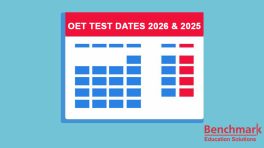OET Speaking: How Should I Address the Interlocutor?


One common question OET candidates often ask with regard to the OET Speaking sub-test is: How should I address the interlocutor? We provide some tips for you here, together with short excerpts of OET speaking scripts. Regardless of the OET Speaking situation you get in your role play, these tips should give you some valuable pointers on how to get the conversation going.
How do I know what the interlocutor’s name is?
When you enter the test room for OET Speaking, the interlocutor should greet you and will usually introduce himself/herself. Do pay attention to this carefully. For instance, the interlocutor may say, “Good morning, my name is Corine Mills”. Sometimes the interlocutor may tell you what you can call him/her. For example, “You can call me Corine”.
Can I ask the interlocutor for his or her name? When should I ask this? At the beginning of the test or when the role play has started?
If you did not get the interlocutor’s name, or, for some reason, the interlocutor did not volunteer his/her name, then it is perfectly acceptable to ask. You can do this in a variety of ways. Here are some suggestions on how to ask for the interlocutor’s name politely:
- I’m sorry, I didn’t get your name.
- May I ask how I should address you?
- If you don’t mind my asking, may I know your name, please?
Can I call the interlocutor by his or her name?
Once you know the interlocutor’s name, the next question in your mind may be whether you can use their name. In some cultures, people tend to like saying, “Yes, Sir,” or “Yes, Ma’am” rather than “Yes, Corine”. Actually, it is perfectly alright to use the interlocutor’s name so we encourage you to do so but this brings us to the next question.
Do I use the interlocutor’s first name (e.g. Corine)? Or do I have to attach a title to his or her name (e.g. ‘Mr. …’ or ‘Ms. …’) and use his/her surname?
So, if the interlocutor’s name is Corine Mills, do you address her as ‘Corine’, ‘Ms Mills’, ‘Mrs Mills’, or ‘Mdm Mills’? Again, it is a cultural thing and different people in different countries will have separate expectations. Actually, for the OET test, it is fine to call the interlocutor by his/her first name, ‘Corine’.
However, if you feel that it is culturally unacceptable to you and you are uncomfortable doing that, the best thing is to ask the interlocutor. When you greet the interlocutor, just say, “May I know how I should address you?” The interlocutor will then tell you, “Oh, you can call me Corine”, or “You may call me Ms Mills”. Then you should just go with what the interlocutor has said.
What about the role play? Can I just assume that the patient uses the interlocutor’s name? Or should the patient in the role play have a different name?
In the role play, you have a few options and these are all acceptable. We list down the various ways you can use to identify the patient and sort out the patient’s name.
- Ask the patient
The most direct way to get the patient’s name is to ask. You can say, “Good morning. I am Dr Abbott. Can I have your name, please?”
If it bothers you and you are still not sure whether to call the patient by his/her first name or to use his/her surname, you can ask, “How would you like me to address you?” However, usually, once the patient has provided a name, it is perfectly alright to use the patient’s first name.
- Just go with the name in the role play card
Obviously, we cannot assume that the role play card will mention the patient’s name or whether it will not. Just go with the instructions in the role play card. If the role play card says ‘Your patient is Agnes, a 22-year-old mother…’ then, obviously, you need to call the patient ‘Agnes’.
- When the role play card does not give you a name
Usually, the role play card will not provide the name of the patient. So, how do you address the patient then? You have a few options:
Refer to the patient using the interlocutor’s name
It is perfectly alright to use the interlocutor’s name as the patient’s name. So, if you already know that the interlocutor is ‘Corine’, then you can start with “Good morning, Corine. I am Dr Abbott. How can I help you today?” Do not worry about how you got to know the patient’s name because in a real-life healthcare situation, usually you would know the patient’s name through the patient card.
Refer to assumed appointment details or hospital information
This depends on the setting which is provided for you in the role play card. Is the setting is in a ‘City Centre General Practice’ of example, you can assume that an appointment was made prior to the patient coming into the practice. So you can say, “Good morning. I am Dr Abbott. I see from your appointment details that you are Corine Mills. Is that correct?”
If the setting is in ‘Hospital Ward’, then you can possibly say, “Good morning, Corine,” straightaway because you can assume that you already know the patient’s name since the patient is still in the hospital ward.
What if the role play card states that the patient is ‘a mother’ but the interlocutor is man? Do I still call the interlocutor by his own name?
Usually, the role play card will be quite general with the patient’s gender and will state ‘the patient’ or ‘his/her’ in order to allow both male and female interlocutors to be the patient. This means that you can use any of the strategies mentioned above to address the patient.
In rare instances, however, sometimes the situation is unique to a female or male patient. For instance, the situation may be about breastfeeding. In this case, the patient should be addressed as a lady and the best approach for this is to use the strategy mentioned above and ask the patient for a name (i.e. “Good morning. I am Dr Abbott. Can I have your name, please?”)
What if I am doing a role play with a patient’s next-of-kin and not the patient?
The same tips apply when you are talking to the patient’s next-of-kin (instead of the patient). For instance, you may be talking to a mother who has brought her 2-year-old son in for treatment. In this case, you are obviously talking to the mother, not the son. However, you will need to refer to the patient once in a while. It is advisable to refer to the patient by name. Pay close attention to the conversation and try and pick up the patient’s name. For example, at the beginning of the role play, the mother may say, “Good morning. I am Corine and this is my son, John”. In this case, try to refer to the patient as ‘John’ as much as you can. This makes the interaction more personal and shows that you have been paying attention to the conversation.
You can always clarify things with the interlocutor
If you are in doubt, just ask the interlocutor during the preparation time for the role play. Just say, “Can I ask you a question? How should I address you in this role play?” Do this before the role play starts – during the preparation time.
Don’t be too worried about this
Don’t worry too much about how to address the interlocutor. Get it right quickly and then move on with the rest of the role play. There are usually many things for you to cover in the role play so do not waste too much time on the form of address. If you require some practice before the OET test, you should do a mock test for OET Speaking. That should boost your confidence and when you are confident, you will tend to speak more fluently.















In writing if todays date is not given means we can put exam date?? If discharge is on today means can we use todays date as discharge date??
Yes, it’s the exam date which is written at the top. Yes, in that case both discharge date and today’s date are the same.